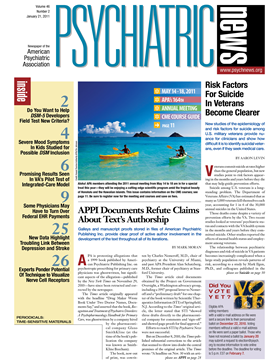Returning combat veterans received a mental health evaluation on the same day that they were seen by a primary care clinician if they were seen in a pilot clinic program that integrated mental health screening into primary care, said Karen Seal, M.D., M.P.H., staff physician on the medical service at the San Francisco Veterans Affairs Medical Center and an assistant professor of medicine and psychiatry at the University of California, San Francisco.
The integrated-care program was begun in 2007 to address the increased physical and mental health needs of returning service personnel, coupled with their underutilization of such services, said Seal, an internist, who spoke at the Trauma Spectrum Conference in Bethesda, Md., last December.
About 37 percent of returning veterans have mental disorders, “but less than 10 percent get adequate services,” she said.
Barriers to proper care often include stigma attached to mental health issues, geographic distance from VA centers, and symptoms of mental health problems such as denial and apathy.
Addressing a variety of medical problems in one initial visit might overcome some of those barriers and get returning troops the help they need, she said.
So medical center officials brought together a team of psychiatrists, psychologists, social workers, neurologists, neuropsychologists, and primary care clinicians to develop a “post-deployment integrated care clinic” at the San Francisco VA.
The clinic provided a three-part initial visit for veterans that included a primary care examination, a social services needs evaluation, and mental health, traumatic brain injury, alcoholism, depression, and PTSD screenings. All clinicians were specially trained in postdeployment health and focused on problems arising during military service.
“We said that if someone served in a war zone, they deserved at least one mental health evaluation by a clinician,” she said. “It normalizes the idea of mental health in primary care.”
The focus was on health and wellness, not pathology, said Seal. Bringing clinicians together in one location would also facilitate coordination of care.
Patients were asked if they wanted to see a “postdeployment stress specialist”—a psychologist trained to work with PTSD patients. If so, they were walked down the hall to the specialist's office.
After that, they could see a “combat case manager” for counseling about psychosocial concerns and veterans benefits. If they screened positive for traumatic brain injury, a neurologist was available for a consultation.
After two years, Seal and her colleagues compared results from the integrated-care clinic with those from usual-care primary care clinics at the San Francisco VA center.
Usual care included a visit with a primary care clinician who did not have specialized training in postdeployment health issues. Mental health and social service visits occurred on the same day only if the patient desired them and if providers were available.
Using VA administrative data on 526 patients, the researchers found that 89 percent of those seen in the integrated-care group received a mental health evaluation on the same day as the initial clinic visit, compared with 51 percent of the usual-care patients.
Women veterans benefitted especially well from the pilot system, the study showed. About 91 percent seen in the integrated-care clinic received a mental health evaluation within 30 days, compared with just 29 percent in the usual-care clinics. Procedures for women vets were the same as for men, but the women were seen in physically separated clinics. Among men, the effect of clinic type on the 30-day evaluation rate (92 percent versus 64 percent) was not statistically significant.
After those initial evaluations, 42 percent of vets in the integrated-care program followed up with a second visit to a specialty mental health care clinician, compared with 29 percent in the usual-care group. The difference was statistically significant, but fell short of what Seal and her colleagues would like to see.
“We're doing a good job in our mission of getting one mental health visit, but not with follow-up,” said Seal. “We may need to consider providing ongoing therapy in primary care clinics, rather than referring these patients out to specialists, and adding care managers to enhance engagement.”
Increasing veterans' engagement with the VA health system could go a long way toward getting them the mental health care they need. It might also help them with many of their general medical problems as well, since vets with mental health diagnoses use medical services at twice the rate of those without such diagnoses, she said.


